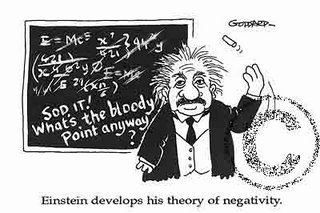Oxford cries 'foul' on new clutch of A-level graduates.

I don't know how many of you follow news in Britain, but this latest development from England's pleasant pastures has my interest piqued.
This year, the English A-level examinations posted a new 'record pass-rate' of 96.9%. This has raised the question: are students getting smarter? or has the examination process been 'dumbed down'.
Oxfordian professors are screeching that the latter is closer to the truth as they welcome students that have a serious deficit in their learning infrastructure,-forcing universities to develop a more remedial aproach to first year learning. The professors in question are at this time speaking anecdotally about changes they have noticed in the 'quality' of their students over the last ten years.
Spokesmen from the British Education ministry have responded by growling that the Oxfordians and their ilk are dinosaurs from a distant educational past where only 3% of students went on to higher education, rather than the 43% in 2005. They are speaking vehemently against the idea that the academic success of an examination process cannot be measured by how many people it fails.
Public opinion seems to be fairly evenly divided into two camps. Camp one says 'tosh and nonsense,-we are very clever thank you awfully', Camp two says 'In my day you couldn't cheat, we sat June exams in large halls with stern supervisors,-nowadays, with the emphasis on individual long projects and GDP's students have greater access to 'help' from family members, the internet ect'.
In Australia, myself and teacher friends have noticed a similar change in learning trends. There is far less emphasis today on 'retained knowledge' than ever. A sit-down supervised examination requires the student to truly 'know' the required information, whereas the assigment allows the student to 'source' information freely and present it at a later date as a coherent whole. I know that I (as a fairly lazy person) love assigments, and still get sweaty-palms before an exmaination. But then, surely educationalists should be asking the question: Which kind of learning is most appropriate in today's education and workforce?
Many university courses today are based heavily on 'course-work' and the number of examinations a student is required to sit for has dropped drastically since our parent's day. Many of my friends doing BA's at Usyd managed to sit about 3 exams total in three years to gain their Baccalaureate. Before you sniff in an oxfordian manner at the humble 'arts' degree, remember that with 1 yr dip ed. these people are becoming the vast majority of teachers in our primary and secondary schools.
Teachers of an older generation are frustrated too. Many new-grads in our schools have Bachelor's degrees, licenses to teach our children and cannot spell. School principles are having to spend time editing reports before they go home to parents (even with the advent of the ubiquitous 'spell-check').
To me, something is definately rotten in the state of Denmark.
Thoughts?


2 Comments:
I think it should be mentioned that as academics get older, accumulate more knowledge, and become more prestigious, they lose sight of their humble beginnings when they too were clueless students. As such, their standards get more unrealistic as they fret over how little students know, and when I was their age I was calculating math in Greek and Latin, and we all lived in a mouldy shoe, and daily whippings were considered good for the soul and...
And there is a much larger knowledge base now than there was in the 60s or 70s. It's so easy to look at yourself and marvel about how much you know and how wonderful you are. Some academics seem to forget the painfully slow learning curve of thirty years it took to get there.
Like so many things in life, it should be about balance. I think Cath has a valid point here, but we can't underestimate the value of coursework and group projects as learning experiences. Unfortunately the education system is hideously underresourced in time, teachers and money.
Post a Comment
<< Home